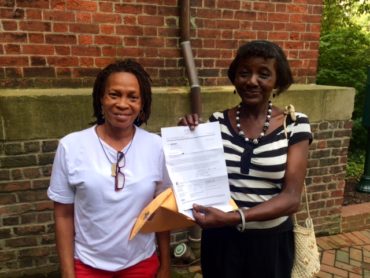Virginia is one of just a handful of states with a law that permanently disenfranchises people with past felony convictions. The others include Florida, Iowa, and Kentucky. Due to grave racial disparities in the criminal justice system, one can imagine the effect this has on communities of color: it strips entire Black and Brown neighborhoods of a voice in our democracy. It’s no wonder scholars have termed Virginia’s felony disenfranchisement law in particular a “ghost” of the state’s Jim Crow past. In 2016, over seven percent of Virginia’s adult population was not eligible to vote due to felony disenfranchisement. That figure was even worse when factoring in race. African Americans accounted for an incredible 53.8 percent of the disenfranchised population, despite comprising only 19.4 percent of Virginia’s adult population.
“I completed my sentence nearly thirty years ago . . . I made a mistake, and I paid for it, and I am a changed person . . . [h]aving the right to vote will make me feel like somebody.” — Ms. Viola Marie Brooks (pictured below), declarant in New Virginia Majority and Advancement Project’s amici curiae brief in Howell v. McAuliffe.
There have been several pushes, though unsuccessful so far, for legislatures to dismantle their harsh felony disenfranchisement laws and institute an automatic restoration process. After all, evidence shows that democratic participation such as voting reduces recidivism. Our laws should encourage citizens to rebuild their lives, not add unnecessary barriers to exercising the fundamental right to vote.
Advancement Project has been advocating rights restoration issues in Virginia since 2003. In recent years, we have partnered with New Virginia Majority to challenge the state’s felony disenfranchisement law, improve its restoration procedures, and educate communities about how to restore their rights. For further information on the history of felony disenfranchisement in Virginia and recent litigation related to this matter, please view Advancement Project’s June 2016 amici curiae brief in Howell v. McAuliffe.

Ms. Louise Benjamin (left) and Ms. Viola Marie Brooks (right) – longtime residents of Richmond, champions of the rights restoration movement, and declarants in our above-referenced amicus brief – attended the July 19, 2016 hearing in Howell v. McAuliffe. Ms. Benjamin stated: “I was overwhelmed with tears when I found out that I could register [to vote]. I felt like I could finally get my life back on track and be somebody.” Ms. Brooks, who was beaming with pride while displaying her official restoration letter in the photo, stated: “I completed my sentence nearly thirty years ago . . . I made a mistake and I paid for it, and I am a changed person . . . [h]aving the right to vote will make me feel like somebody.” Ms. Brooks fulfilled her dream of voting the first time in her life in November 2016. Tragically, she passed away in early 2017.